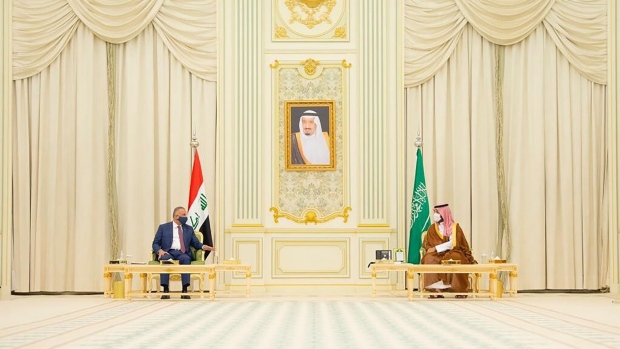Oct 10, 2021
Iraq’s Election to Have Repercussions Far Beyond Ruling Baghdad
, Bloomberg News

(Bloomberg) -- As promised by Prime Minister Mustafa al-Kadhimi, voters get an early chance Sunday to judge Iraq’s 17-month government at parliamentary elections, leaving the premier’s attempts to calm a major source of Persian Gulf insecurity and repair his nation’s oil industry hanging in the balance.
Sectarian allegiances, anger over crippling power cuts and entrenched corruption will be uppermost in the minds of Iraqis who vote, and will likely prompt many others to boycott the first poll since 2019 protests toppled a predecessor administration.
But the ballot will have far broader repercussions. Unable to forge a consensus in Iraq’s fractured politics on tackling domestic crises, and aware Baghdad needs all the friends it can get to recover from years of ruinous conflict, al-Kadhimi, 54, has invested political capital in brokering talks between Shiite power Iran and Saudi Arabia’s Sunni monarchy, whose rivalry convulses parts of the Middle East.
And he’s sought to replace international oil companies exiting Iraq, securing a $27 billion investment agreement with France’s TotalEnergies SE. Both could be in peril if al-Kadhimi’s supporters fail to win enough of parliament’s 329 seats to propel him to a new term.
Iraq Eyes New Regional Role and Looks for Help to Rebuild
The Saudi-Iran diplomacy “has continued because of the personal involvement of the Iraqi prime minister,” said Renad Mansour, director of the Iraq Initiative at Chatham House in London.
“He has a personal history with the actors in both countries and used that leverage when he became prime minister,” Mansour said. “In the context of the potential U.S. withdrawal, Saudi Arabia and Iran also saw the need for a security dialogue so that there would be no vacuum.”
Al-Kadhimi and U.S. President Joe Biden agreed in June to wind down the American combat mission in Iraq by the end of this year, leaving only a training presence to help confront Islamic State militants. The deal relieved pressure on the Iraqi leader, with hard-line Shiite groups demanding all of the remaining 2,500 American troops leave the country.
Iran-backed militias in Iraq have launched rocket and drone attacks against bases housing U.S. troops, especially following the January 2020 drone strike that killed a top Iranian general at Baghdad’s airport. The assassination was part of a proxy conflict that sparked to life after former President Donald Trump abandoned the 2015 deal that had capped Iran’s nuclear program. Talks to revive the pact have stalled.
A former intelligence chief, al-Kadhimi’s not personally contesting Sunday’s ballot. After the protests ebbed, he emerged in 2020 as a compromise candidate capable of securing the backing of the influential Shiite movement of populist cleric Moqtada al-Sadr, some Sunni moderates and ethnic Iraqi Kurds.
Their support is his most probable path to another term. Results are due Monday but it might take months of horse-trading before a new coalition government is installed. The wrangling will most likely delay resumed talks with the International Monetary Fund for a loan of up to $4 billion.
Al-Sadr’s alliance, whose nationalist credentials are a counterweight to the more pro-Iran Shiite factions who have ruled over Iraq for much of the period since the 2003 U.S. invasion ousted Saddam Hussein, is expected to do well. But it’s unclear whether it can repeat its 2018 success of seizing 54 seats in parliament, the biggest single bloc.
Al-Kadhimi’s leading opponent for the top office could be Hadi Al-Amiri, a leader with close links to Tehran whose Fatah Alliance came second three years ago. Former prime ministers Nouri al-Maliki and Haider al-Abadi are also in the running.
It’s the first vote under a new map that divides the country into smaller electoral districts, with party lists abolished and all votes now cast for an individual candidate.
The changes were designed to boost the chances of independents and reduce the power of established parties. Both were central demands of the protesters in 2019. But candidates unaffiliated with major groups have struggled to make an impact since al-Kadhimi advanced a vote originally scheduled for next year.
Ali Hussein, a 51-year-old shopkeeper in northern Baghdad, said Al-Kadhimi deserved more time to fix some of Iraq’s problems.
“He has balanced the influence of neighboring countries and is doing as much as he can for the people,” he said. But in Iraq, when “we wish for something, compromise brings something else. This is how politics work here.”
©2021 Bloomberg L.P.


